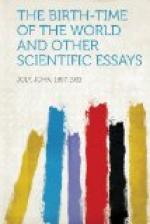This last fact is an illustration of a consideration which must enter into the phenomenon which an eminent biologist speaks of as physiological or unconscious “memory,"[1] For the development of the organism from the ovum is but the starting of a train of interdependent events of a complexity depending upon the experience of the past.
[1] Ewald Hering, quoted by Ray Lankaster, The Advancement of Science, p. 283.
111
In short, we may suppose the entire development of the plant, towards meeting certain groups of external conditions, physiologically knit together according as Nature tends to associate certain groups of conditions. Thus, in the case in point, climatic rigour and scarcity of pollinating agency will ever be associated; and in the long experience of the past the most economical physiological attitude towards both is, we may suppose, adopted; so that the presence of one condition excites the apparent unconscious memory of the other. In reality the process of meeting the one condition involves the process and development for meeting the other.
And this consideration may be extended very generally to such organisms as can survive under the same associated natural conditions, for the history of evolution is so long, and the power of locomotion so essential to the organism at some period in its life history, that we cannot philosophically assume a local history for members of a species even if widely severed geographically at the present day. At some period in the past then, it is very possible that the individuals today thriving at Paris, acquired the experience called out at Upsala. The perfection of physiological memory inspires no limit to the date at which this may have occurred—possibly the result of a succession of severe seasons at Paris; possibly the result of migrations —and the seed of many flowering plants possess means of migration only inferior to those possessed by the flying and swimming animals. But, again, possibly the experi-
112
ence was acquired far back in the evolutionary history of the flower.[1]
But a further consideration arises. Not only at each moment in the life of the individual must maximum income and most judicious expenditure be considered, but in its whole life history, and even over the history of its race, the efficiency must tend to be a maximum. This principle is even carried so far that when necessary it leads to the death of the individual, as in the case of those organisms which, having accomplished the reproductive act, almost immediately expire. This view of nature may be repellent, but it is, nevertheless, evident that we are parts of a system which ruthlessly sacrifices the individual on general grounds of economy. Thus, if the curve which defines the mean rate of reception of energy of all kinds at different periods in the life of the organism be opposed by a second curve, drawn below the axis along which time is measured, representing the mean rate of expenditure of energy on development, reproduction, etc. (Fig. 7), this latter curve, which is, of course,




